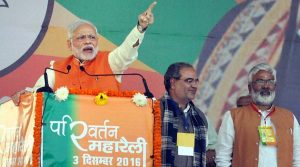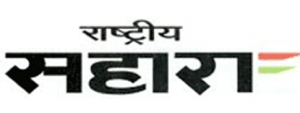
15-12-2016 (Important News Clippings)
To Download Click Here
Resilient Chennai
Cyclone Vardah shows why Indian cities must prepare for major disasters

Just as in the aftermath of the devastating floods that swamped Chennai last December, cyclone Vardah that tore through the city on Monday brought to the fore the fighting spirit and resilience of its residents. Thousands of trees were felled, power tripped, mobile networks went down, travel by air, rail or road ground to a halt. Just moments after the storm blew over, citizens were out on the streets doing everything within their means to get their city back on its feet.
Unlike in the run-up to the deluge last year, the authorities had put in place elaborate plans to cope with the after effects of the storm that had Chennai in its eye. But apparently there was a miscalculation: floods were anticipated, not the high velocity winds that swept through the city bringing down the trees on the city roads. Government agencies went into overdrive clearing the roads and restoring essential services. They were joined by motley bands of volunteers and the common people who filled in the gaps in resources and manpower. These nameless people were everywhere, guiding ambulances, reaching food to those who lost their homes, coming to the aid of the infirm and manning helplines. Within 24 hours of the storm, power was restored in most parts of the city, mobile networks were up, the airport resumed operations, bus services picked up, traffic flowed freely on the roads and offices reported good attendance.
The blow was huge. A lot still remains to be done. To augment the state’s agencies central forces were at hand. A cyclone can be predicted and its course charted precisely. This need not be the case with other disasters, natural or man-made. It will be prudent for each state to form an alliance with its neighbours who can pool in resources and have a specialised force on the lines of the NDRF always prepared to meet such exigencies in their domain. It may not be in our hands to prevent disasters. We can only be prepared.
संरक्षण का सहारा
प्रौद्योगिकी से जुड़ी नए दौर की देश की दो प्रमुख कंपनियों फ्लिपकार्ट और ओला ने बीते सप्ताह सरकार को खूब मशविरे दिए। एक प्रौद्योगिकी समारोह में फ्लिपकार्ट के सचिन बंसल और ओला के भाविश अग्रवाल ने कहा कि सरकार को अब वह बात कह देनी चाहिए जो चीन ने 15 साल पहले कही थी। वह यह कि हमें आपकी पूंजी चाहिए लेकिन हमें आपकी कंपनियां नहीं चाहिए। दोनों ने सरकार से यह भी कहा कि वह अपने फैसलों में देश का अधिक से अधिक ध्यान रखे। उन्होंने यह भी कहा कि एक विदेशी कंपनी प्रधानमंत्री से उनकी तुलना में जल्दी मुलाकात कर सकती है। यह भाषा बॉबे क्लब की 23 साल पहले की जुबान से बहुत हद तक मेल खाती है। दोनों कारोबारियों की मुख्य शिकायत यह थी कि विदेशी कारोबारियों ने भारी भरकम पूंजी की बदौलत भारतीय कंपनियों के लिए कारोबार मुश्किल बना दिया है। यह बात जोर पकड़ रही है क्योंकि मोबिक्विक के सीईओ विपिनप्रीत सिंह ने भी अलीबाबा पर आरोप लगाया कि वह पेटीएम की बाजार हिस्सेदारी बढ़ाने के लिए इफरात पूंजी झोंक रही है।
Date: 15-12-16
आखिर बैंक में जमा से क्यों है दूरी?
भारतीयों के अपना पैसा बैंकों में जमा न करने की एक वजह यह भी हो सकती है कि देश की बैंकिंग व्यवस्था हकीकत से दूर है। इस संबंध में विस्तार से जानकारी दे रहे हैं अजित बालाकृष्णन
सीमित असर वाला सुझाव
एक प्रत्याशी को दो सीटों से चुनाव लड़ने की छूट को समाप्त करने या फिर उसके दोनों सीटों से जीतने की स्थिति में रिक्त सीट के उपचुनाव का खर्च उठाने की जिम्मेदारी उसी पर डालने का प्रावधान बनाने की जो सिफारिश चुनाव आयोग ने की वह सीमित प्रभाव वाली ही है। आज आवश्यकता इस बात की है कि लंबे समय से विचार-विमर्श का विषय बने चुनाव सुधारों की दिशा में तेजी से आगे बढ़ा जाए। यह ठीक नहीं कि चुनाव सुधारों पर चर्चा तो बहुत हो रही है, लेकिन उन्हें अपनाने से बचा जा रहा है। आवश्यक केवल यह नहीं है कि जिन पर किसी किस्म की सार्वजनिक देनदारी बकाया है उन्हें चुनाव लड़ने के अयोग्य ठहराया जाए, बल्कि इसकी भी है कि उन्हें भी चुनाव लड़ने से रोका जाए जो संगीन आपराधिक मामलों का सामना कर रहे हैं। चुनाव आयोग एक अर्से से यह कोशिश कर रहा है कि कम से कम उन्हें तो चुनाव लड़ने से रोका ही जाए जो किसी गंभीर मामले के अभियुक्त हैं और जिनके खिलाफ आरोप पत्र भी दायर हो चुका है, लेकिन राजनीतिक दल आनाकानी करने में लगे हुए हैं। चुनाव आयोग के इस सुझाव पर राजनीतिक दलों का तर्क है कि दोषी साबित न होने तक हर किसी को निर्दोष समझा जाना चाहिए। यह तर्क सही है, लेकिन आखिर राजनीतिक दल इसके लिए सहमत क्यों नहीं होते कि ऐसे लोगों को चुनाव लड़ने से रोका जाए और साथ ही यह सुनिश्चित किया जाए कि उनके मामलों का निपटारा एक निश्चित अवधि में हो?
नि:संदेह इस मामले में न्यायपालिका को भी सक्रिय भूमिका का परिचय देना होगा। यह ठीक नहीं कि न्यायपालिका राजनीति के अपराधीकरण पर तो खूब चिंता जताती है, लेकिन राजनीति को आपराधिक प्रवृत्ति और इतिहास वालों से बचाने के मामले में अपना सक्रिय योगदान देने के लिए तैयार नहीं। प्रधानमंत्री नरेंद्र मोदी ने सुप्रीम कोर्ट से यह अनुरोध किया था कि वह ऐसी व्यवस्था बनाए जिससे नेताओं के मामलों का निपटारा एक निश्चित अवधि में हो सके, लेकिन किन्हीं कारणों से उसे ठुकरा दिया गया। बेहतर हो कि सुप्रीम कोर्ट इस अनुरोध पर फिर से विचार करे। राजनीतिक दलों को यह समझना हगा कि अगले चरण के चुनाव सुधारों में आवश्यकता से अधिक देरी से आम जनता को यही संदेश जा रहा है कि वे खुद को किसी तरह के सुधारों का हिस्सा बनाने के लिए तैयार नहीं। जरूरी नजर आने वाले चुनाव सुधार खुद राजनीतिक दलों के अपने हित में हैं। राजनीतिक दलों को चुनाव सुधारों के साथ-साथ राजनीतिक सुधारों की दिशा में भी आगे बढ़ना चाहिए, क्योंकि इसका कोई औचित्य नहीं कि प्रत्येक क्षेत्र में तो सुधार हों, लेकिन हर क्षेत्र को प्रभावित करने वाली राजनीति पुराने तौर-तरीकों से ही संचालित होती रहे। राजनीति के पुराने तौर-तरीकों से संचालित होने के कैसे-कैसे दुष्परिणाम सामने आ रहे हैं, इसका ताजा और शर्मनाक उदाहरण है संसद के शीतकालीन सत्र का करीब-करीब पूरा बर्बाद हो जाना। यह पहली बार नहीं जब संसद के किसी सत्र में कोई कामकाज न हुआ हो। पिछले कुछ सत्रों में ऐसा कई बार हो चुका है और सबसे खराब बात यह है कि अक्सर ऐसा रह-रहकर होने लगा है जब एक के बाद एक कई संसद सत्रों में कुछ खास काम नहीं होता। इस बार तो राजनीतिक दलों के रवैये के कारण संसद में सामान्य चर्चा तक नहीं हो सकी।
Through a storm, safely
A year after the devastating deluge, Chennai’s resilience has been challenged by the severe cyclonic storm, Vardah. Equipped with survival lessons from the December 2015 floods and helped by an efficient flow of disaster warning messages, the city and neighbouring districts held together through several hours of fierce winds. Chennai’s trees bore the brunt, many uprooted or torn down irredeemably. The storm hobbled the city’s infrastructure by nightfall, downing power and communication cables, blocking roads, disrupting rail and air transport, and spreading a carpet of darkness. It is to the Tamil Nadu government’s credit that basic mobility was restored overnight, and fallen trees were removed to allow some traffic to ply. Vardah also demonstrated that in the time of social media and the Internet, speedy official and community messages can influence the outcome of a catastrophe. While economic damage was inevitable, cautionary advice put out on social platforms urging people to stay safe helped reduce the number of casualties. Remarkably, the community also responded with alacrity, creating online groups and sharing messages offering help and advice. It is of course possible to learn even more by going back to citizens and harnessing data on their experience using online tools.
Tropical storms are an annual affair, with the more vulnerable eastern coast taking a pummelling from 92 severe cyclones out of a total of 262 between 1891 and 1990, and several more in the years since. Such weather events are a part of the climate system, and their impact in the form of economic losses could well be greater going forward, as development creates more assets in coastal cities. It is vital, therefore, that the learnings from each event are shared nationally, and the capacity of officials and communities to manage disasters built continuously. Such an approach helps coastal regions in the United States prepare for and deal with storms better. Among the securities available to individuals in many countries is insurance against property losses. Viable policies should be made available in India too, as this would bring scrutiny on administrative measures and potentially improve outcomes. A citywide blackout also underscores the importance of rooftop solar and battery storage systems as supplementary power sources for households and corporates. Planting trees with strong root systems and pruning the canopy ahead of cyclone season could reduce uprooting. In the aftermath of Vardah, the Tamil Nadu government should restore infrastructure and provide priority relief to the families of those who lost their lives, and the worst-hit communities.
Date: 14-12-16
Free flow of wheat
The Centre’s decision to waive import duty on wheat has predictably attracted flak. Opposition parties have questioned the move, which comes days after the government’s assertion that demonetisation of high-value currency notes did not impact the sowing of the rabi crop, with a greater area being cultivated compared to the same time a year ago. Assembly polls are due soon in Uttar Pradesh and Punjab, both large wheat-producing States, making this a plausible rallying point for the Opposition. Farmer unions have warned of dumping of wheat stock in India at a time when the minimum support price (Rs.1,625 a quintal) is higher than international prices. This, they argue, could lead to distress sales when the current crop is harvested over March-April. The government, on its part, has noted concerns about the warmer winter forecast, which could affect wheat output and trigger inflation. This February, when prices of food articles that make up 46 per cent of the consumer price index were cooling off, the government expected the trend to continue if the monsoon was normal after two years of drought. Now at year-end, following a normal monsoon, inflation remains under control but wheat prices have been moving up swiftly.
There is no doubt that fiddling too often with wheat import duties — from 10 per cent to 25 per cent, then back to 10 per cent and finally to zero, all within 500 days — sends mixed signals to farmers and traders, though the latter group will be pleased with the duty-free regime. But equally, it is necessary to change one’s mind when the situation so demands, which it currently does. A record global harvest has lowered wheat prices internationally. With a higher MSP, and speculation about a less-than-adequate harvest domestically, the government is obviously keen on avoiding a surge in inflation following the demonetisation process. With imports remaining duty-free, it is now clear to traders that hoarding reserves and profiteering from the systemic stress won’t pay for long, even though it will take a couple of months or so for the first such shipments to arrive from overseas. Farmers busy with the rabi sowing season may not rally to political provocations immediately. But by the time they harvest the crop four months from now, the Centre would be well-advised to spruce up its procurement act, and raise awareness about the MSP mechanism. A longer-term action plan is needed to increase India’s wheat yields, which in most States are lower than in China and Bangladesh.
Chaff in the wheat
Centre gets timing wrong on imports. Farmer, consumer will have to bear the consequences.
Allowing duty-free imports of wheat in the middle of the sowing season, especially when farmers need to be incentivised to produce more of the crop that’s in short supply, isn’t economically the smartest thing to do. Nor is it politically the most expedient, when the country’s two largest wheat-producing states — UP and Punjab — are headed for assembly polls early next year. But given the prevailing situation, the Narendra Modi government was probably left with no choice. Wheat stocks in the central pool have already depleted to nine-year lows.
The new marketing season, beginning April, is likely to see reserves plunge below minimum buffer norms. With farmers short on cash following demonetisation, production prospects for the wheat currently being sown seem uncertain. That being so, the government could have taken few chances. Politically, too, pricey roti can exact a heavier cost than dal, pyaaz or aloo.
The mistake that the Modi government has made is fundamentally about timing, the blame for which lies with the agriculture ministry. By March this year, it was clear that the 2015-16 wheat crop in India wasn’t going to be good. Poor soil and sub-soil moisture levels, thanks to drought, aggravated by high temperatures and absence of winter rain, made this near-inevitable. It was confirmed further during the marketing season, when government agencies were able to procure hardly 23 million tonnes (mt) of grain, compared to 28 mt during the same period last year. Yet, the agriculture ministry reckoned production first at 93.82 mt on February 15 and raised it to 94.04 on May 9, before a marginal downward revision to 93.50 mt on August 2. Krishi Bhawan’s rosy output estimates — as against the private trade’s 80-85 mt and the 2014-15 production figure of 86.53 mt — is what led to the clamping of a 25 per cent import duty on wheat, applicable “without an end date”. This, when open market prices were already firming up by early-May and the situation actually demanded a duty reduction. Farmers wouldn’t have minded that since the bulk of their crop had been sold by then. Had imports been sufficiently contracted during June-August, the current market tightness wouldn’t have arisen. Instead, the duty was cut to 10 per cent as late as September 23 and to nil on December 8, just when farmers are planting the new crop.
The wheat episode reflects poorly on the agriculture ministry’s crop estimation machinery and market intelligence systems. Setting that right, including fixing responsibility, has to be accorded top priority. For now, the cost will be borne, unfortunately, by the Indian consumer and farmer.
Date: 14-12-16
Post-demonetisation, Modi govt could try simultaneous Parliament and state polls
However, this will be vigorously challenged.

Interestingly, Narendra Modi did some thinking aloud on simultaneous polls at an all-party meeting chaired by the speaker, and later at the BJP’s national executive some months ago. He then raked up the theme again just a few days before demonetisation. It is now known in the public domain that he recently went one step further and asked the Niti Aayog to work out details, if simultaneous Parliament and assembly elections were to be held in 2019 or earlier.
Modi is essentially in tune with the RSS’s thinking which has always spoken for one country, one language, one civil code, etc. The BJP’s earlier avatar, the Jana Sangh, also favoured simultaneous polls and a unitary system. However, of late, Modi has invested every ounce of his political capital and energy on demonetisation. Although some sections have welcomed his move for rendering a blow to black money, many people think he has gone for a big gamble without working out the details of how to run a cash economy with 86 per cent of Rs 1000 and Rs 500 notes withdrawn, and only 14 per cent cash left in the hands of the government, banks and people.
Many BJP MPs, chief ministers and MLAs are sulking and waiting anxiously for applause that is not forthcoming from the long queues of people waiting for a pittance of their own money. Many BJP MPs and MLAs are not sure about the impact of demonetisation on their own electoral prospects. The test will come in the forthcoming Uttar Pradesh elections likely to be held in just three months. The outcome of the UP polls will define politics through Narendra Modi’s two remaining years during his present term. The UP election may also decide whether he will be able to go in for simultaneous polls to Parliament and state assemblies.
From Modi’s speeches, it is clear he has chosen to go to the people almost daily to justify demonetisation, promising better days ahead if they go digital and run their lives with e-wallets via their mobiles. It is not yet clear whether his assurances will cut much ice with the people. But even if his party puts up an impressive performance in UP, his plans for simultaneous polls may not have smooth sailing. Indira Gandhi earlier, and the Janata government after the Emergency, dissolved state assemblies, declaring the assemblies had lost the people’s mandate taking into account the outcome of the Parliamentary election — a point that is always presumptive. It will be difficult for Modi to find an argument for dissolving existing assemblies in the name of simultaneous elections on the plea that these will save the nation considerable money.
While state chief ministers will look at Modi’s plan from their own point of view, the judiciary can prove to be a major impediment. The Supreme Court could stand in the way. It could hold cutting short a duly elected assembly’s life, which is still enjoying a majority, as ultra vires. The Supreme Court may invoke the “basic structure” theory it pronounced in1973 when Mrs Gandhi was fiddling with Constitutional values and institutions, holding that Parliament and the executive cannot amend the basic structure of the Constitution to suit their political convenience. It could pronounce that the federal principle and the articles defining the lakshman rekha between the central authority and the states’ rights are a part of the basic features of the Constitution; these cannot be done away with by the centre’s fiat suddenly dissolving assemblies.
Strong leaders heading single-party governments at the centre have the tendency to consolidate their hold in the country through convenient governments in the states. They tend to disregard the federal principle enshrined in the Constitution. But there is a fine balance between the powers of the centre and what falls in the states’ remit.
Mrs Gandhi used all means, often by encouraging defections, even encouraging factionalism within her own party units in the states, to change regional chief ministers. She liberally used Article 356 to impose central rule in states, often by contriving situations. Narendra Modi’s government has shown a similar predisposition. This is clear from recent moves his party and centrally appointed governors made in Uttarakhand and Arunachal Pradesh — but the courts didn’t look kindly at these centrally-sponsored toppling operations.
Simultaneous polls will clearly involve cutting short several assemblies to impose President’s rule. Exercising wilful central authority to displace elected state governments can hurt regional pride. The dissolution of state assemblies will be unwelcome in most states. Such moves may advance the Modi government’s designs for a unitary form of governance, but wouldn’t advance its democratic credentials, nor the concept of cooperative federalism his party has spoken about in its manifesto. Such moves can be dangerous for the country.
(This article first appeared in the print edition under the headline ‘Crossing the federal line’)
गेहूं के कर-मुक्त आयात की नीति से मंडराते खतरे
केंद्र सरकार ने गेहूं के आयात पर लगने वाले ‘आयात शुल्क’ को पूरी तरह से खत्म करने का फैसला किया है। यानी गेहूं के आयात पर अब तक लग रहे 10 फीसदी शुल्क को हटा लिया गया है। अब विदेशों से गेहूं आयात करने पर किसी तरह का ‘कर’ नहीं लगेगा। कर-रहित आयात को मंजूरी मिल जाने से बाजार में विदेशों से आयातित सस्ते गेहूं की बहुतायत होगी, जिससे देश के किसानों को गेहूंं की कम कीमत मिलेगी और सीधे तौर पर वे प्रभावित होंगे। इसके पहले सितंबर में खाद्य मंत्रालय ने गेहूं के आयात शुल्क को 25 फीसदी से घटाकर 10 फीसदी कर दिया था। वह शून्य आयात कर की दिशा में एक पहला कदम था। पिछले दो वर्षों से सूखे की मार झेलते किसानों के लिए इस बार ‘आयात की मार’ किसी बड़ी चुनौती से कम नहीं होगी। गेहूं उत्पादन के मामले में सरकार के अग्रिम अनुमान भी सवालों के घेरे में हैं। शुरू के दो अनुमानों में सरकार द्वारा गेहूं उत्पादन का अनुमान 9.38 करोड़ टन तथा तीसरे अनुमान में 9.44 करोड़ टन बताया गया था। पर अगस्त में जारी चौथे अनुमान में यह आंकड़ा घटकर 9.35 करोड़ टन पर पहुंच गया।
नोटबंदी का फैसला कई जगहों पर फायदा देगा, मगर किसानों पर इसका प्रतिकूल असर पड़ा है और उनकी जरूरतें प्रभावित हुई हैं। गांवों में एटीएम व पेटीएम सुविधा न के बराबर होने से उन्हें बीज, खाद, सिंचाई, मजदूरी और अन्य आवश्यक वस्तुओं की खरीदारी में खासी परेशानी झेलनी पड़ी है। इसी वर्ष अगस्त में खाद्य मंत्रालय के प्रतिनिधियों से मुलाकात के बाद ब्राजील सरकार से न्यूनतम समर्थन मूल्य पर दाल खरीदे जाने की बात सामने आई थी। खाद्य मंत्रालय की दलील थी कि दाल की आपूर्ति के लिए विभिन्न देशों पर निर्भर रहने की बजाय एक ही देश पर निर्भर रहना सही है। इससे भी पूर्व में केंद्र सरकार द्वारा मोजांबिक सरकार के साथ अफ्रीकी देशों से दालों का आयात बढ़ाने हेतु करार किया जा चुका है। खाने-पीने व रोजमर्रा की अन्य वस्तुओं की प्रचुर मात्रा में उपलब्धता सुनिश्चित करने की सरकार की मंशा वाजिब है, पर अपने देश के सबसे बड़े जनसंख्या समूह के साथ ऐसा प्रयोग करना, जिससे उनकी रोजी-रोटी प्रभावित हो, कतई तर्कसंगत नहीं है। एक ओर खाद्य विभाग घरेलु उत्पादन बढ़ाने की अपनी प्रतिबद्धता जाहिर करता रहा है, परंतु कदम ऐसे उठाए हैं, जिनसे विदेशों पर अपनी निर्भरता घटने की बजाय बढ़ी ही है।
संसद में भी इस बात की पुष्टि की जा चुकी है कि देश में खेती योग्य भूमि में प्रतिवर्ष औसतन 30 हजार हेक्टेयर की कमी दर्ज हुई है। देश का मात्र 45 प्रतिशत भूमि सिंचित है। बाढ़, ओलावृष्टि तथा सूखे की समस्या इनका पीछा नहीं छोड़ती। ऐसे में, ब्राजील के किसानों को दाल का एमएसपी तथा यातायात पर वहन किए जाने वाले खर्च की बजाय भारतीय किसानों को उचित समर्थन मूल्य प्रदान करने का प्रयास अच्छा विकल्प हो सकता था।
बेहतर उत्पादन के दावों के बावजूद गेहूं की सरकारी खरीद तीन करोड़ टन के लक्ष्य के मुकाबले 2.3 करोड़ टन रही, जो पिछले साल से लगभग 50 लाख टन कम है। नतीजन, सेंट्रल पूल में गेहूं का स्टॉक एक दिसंबर को घटकर 164.96 लाख टन रह गया, जो पिछले नौ वर्षों में सबसे निम्न स्तर पर है। पिछले वर्ष यह आंकड़ा 268.79 लाख टन था। समस्या सिर्फ एक फसल के साथ नहीं है। खरीद नीति के सफल क्रियान्वयन न होने की वजह से गन्ना किसानों को औने-पौने दामा पर उत्पाद बेचना पड़ रहा है। इसी वर्ष टमाटर उत्पादकों को भी बड़ा झटका लगा है। उन्हें एक-दो रुपये प्रति किलो के भाव पर टमाटर बेचने को मजबूर होना पड़ा। बढ़ती महंगाई, किसानों की वर्तमान आय और नई सरकारी नीतियों के मकड़जाल में किसानों की आय दोगुनी होती नहीं दिख रही। कृषि की दृष्टि से वर्ष 2016-17 पिछले दो फसल वर्ष की अपेक्षा ज्यादा अनुकूल प्रतीत हुआ। लगातार सूखे के बाद इस वर्ष मानसून भी मेहरबान रहा। समय से सर्दी पड़ने की वजह से गेहूं को उचित तापमान मिल रहा है, गेहूं की बुआई का रकबा भी बढ़ा है। बंपर फसल के आसार के बीच यह मौसम किसानों के लिए कमाई को बढ़ाने का यह आदर्श मौका था, परंतु आयात शुल्क के हटाए जाने से उनका हौसला कमजोर हुआ है।
के सी त्यागी, वरिष्ठ जद-यू नेता (ये लेखक के अपने विचार हैं)
Date: 14-12-16
भ्रष्टाचार की नई मुद्रा
अभी दो दिन पहले तक लग रहा था कि इस हरकत में कुछ लोग ही शामिल हैं। कुछ बैंक कर्मचारी, कुछ मैनेजर, कुछ सोने के व्यापारी नोटबंदी के बाद के हालात का फायदा उठाते हुए चांदी काट रहे हैं। इनके पकड़े जाने की खबरें आश्वस्त भी करती थीं कि ऐसे मामले बहुत आगे नहीं जा सकेंगे, क्योंकि सरकार की एजेंसियां सक्रिय हो चुकी हैं। लेकिन पिछले दो दिनों में जिस तादाद में नए नोट बरामद हुए हैं, वे चौंकाते हैं। उस समय, जब आम लोग भटक रहे हैं, बैंक शाखाओं और एटीएम के बाहर लंबी लाइनों में जूझ रहे हैं और उन्हें हजार-दो हजार रुपये भी नहीं मिल पा रहे, तब कई लोगों के पास करोड़ों रुपये के नए नोट बरामद हो रहे हैं। मंगलवार को बेंगलुरु में जिस तरह से भारतीय रिजर्व बैंक के एक बड़े अधिकारी की गिरफ्तारी हुई, वह बताता है कि भ्रष्टाचार का जाल कितना फैला हुआ है। इस अधिकारी को डेढ़ करोड़ रुपये की नई मुद्रा को पुरानी मुद्रा से बदलने के लिए गिरफ्तार किया गया था। यह मामला अब तक पकड़े गए ऐसे मामलों से कहीं ज्यादा गंभीर है। एक तो इसलिए कि जिस अधिकारी को पकड़ा गया, वह काफी वरिष्ठ है और दूसरे इसलिए कि रिजर्व बैंक ऐसा बैंक नहीं है, जो आम लोगों से पैसे का लेन-देन करता हो और उसमें कुछ हेरा-फेरी कर दी गई हो। रिजर्व बैंक की भूमिका उन व्यावसायिक बैंकों तक नकदी पहुंचाने की है, जो आम लोगों, व्यापारियों, कंपनियों आदि से लेन-देन करते हैं। ऐसे में, अगर रिजर्व बैंक का एक अधिकारी ही घपले में शामिल है, तो इसका अर्थ है कि इस गड़बड़ी के तार कई जगहों से जुड़े हैं।
नोटबंदी से अंत में आम लोगों को ही फायदा मिलेगा, इस बात में शायद ही किसी को संदेह हो, लेकिन यह भी सच है कि अभी तक इसने आम लोगों को ही सबसे ज्यादा परेशान किया है। इसका एक कारण नई नकदी की कमी तो है ही, साथ ही यह भी है कि यह काम हमें उसी तंत्र से करवाना है, जो काले धन की अर्थव्यवस्था में प्रत्यक्ष या अप्रत्यक्ष रूप से सहयोगी की भूमिका निभाता रहा है। रिजर्व बैंक द्वारा छापी गई जिस नई नकदी को लोगों की जेब में पहुंचना चाहिए था, अगर वह उसकी जगह कुछ खास लोगों की तिजोरियों में पहुंच रही है, तो यह चीज अपने आप में बहुत कुछ कहती है। इसका हम अगर ठीक से अध्ययन करें, तो समझ सकेंगे कि हमारी बैंकिंग व्यवस्था की वास्तविक प्राथमिकता कहां है, धन का प्रवाह इस देश में सबसे पहले कहां होता है? यह भी सच है कि अर्थव्यवस्था में जितनी नकदी होनी चाहिए, उसकी एक तिहाई ही इस समय पहुंच सकी है। नकदी की इस किल्लत ने भी समस्या को बढ़ाया है। चूंकि नकदी की किल्लत है, इसलिए इस समय उसकी ही कालाबाजारी हो रही है और उसकी ही जमाखोरी। जब सोने से लेकर जमीन-जायदाद, सबके दाम गिर रहे हों और आगे भी गिरते रहने की आशंका हो, तो नकदी पास में रखना ही बहुत से लोगों को ज्यादा फायदेमंद लग सकता है।
लेकिन एक और बात ध्यान देने की है। अगर एक सरकारी व्यवस्था के कुछ लोग इस घपले में शामिल हैं, तो वह भी एक सरकारी व्यवस्था ही है, जो ऐसे घपलों को उजागर कर रही है और घपलेबाजों की धर-पकड़ कर रही है। यह काम किन्हीं एक-दो जगहों पर नहीं, देश भर में हो रहा है। इससे यह उम्मीद तो बंधती ही है कि ऐसी गड़बड़ियां बहुत आगे नहीं जाएंगी और नई नकदी ने पुरानी की जगह ले ली, तो चीजें बहुत कुछ सामान्य होने लगेंगी। जहां तक काले धन का मामला है, तो इसके खिलाफ लड़ाई सिर्फ इतने से खत्म नहीं होगी। यह लड़ाई अभी काफी लंबी चलेगी और इसे खुद प्रधानमंत्री नरेंद्र मोदी भी कह चुके हैं।
चेतावनी काम आई
तमिलनाडु के चेन्नई एवं पड़ोसी राज्य आंध्र प्रदेश व कर्नाटक में चक्रवात ‘‘वरदा’ अनुमान के मुताबिक ही 120 किमी प्रति घंटे की रफ्तार से आया। तूफानी हवाओं के थपेड़ों ने परिसंपत्तियों को ज्यादा नुकसान पहुंचाया। 260 पेड़, 37 बिजली के खंभे व 24 घर गिर गए। इसके चलते रेल, बस और हवाई सेवाएं पूरी तरह बंद करनी पड़ी। दरअसल, देश हमेशा प्राकृतिक आपदा की जद में रहता है। इसकी 7516 किलोमीटर लंबी तटीय रेखा उष्णकटिबंधीय चक्रवात के लिहाजन 10 फीसद जोखिम में है। प्रत्येक वर्ष औसतन 5 से 6 उष्णकटिबंधीय चक्रवात भारत में आते हैं, जिनमें से ज्यादातर बंगाल की खाड़ी में होते हैं। मॉनसून के बाद चक्रवात अक्सर आते हैं और आमतौर पर उनकी तीव्रता अधिक विनाशकारी होती है। अनुमान है कि 58 फीसद चक्रवाती तूफान बंगाल की खाड़ी में उत्पन्न होते हैं, जो अक्टूबर और नवम्बर में तटीय इलाकों को प्रभावित करते हैं। लेकिन इस बार सही वक्त पर सटीक सूचना और सतर्कता की वजह से कम जानें गई। सरकार ने 100 के करीब राहत शिविर लगाकर 16 हजार से भी ज्यादा लोगों को सुरक्षित स्थानों पर पहुंचाया। कम क्षति होने के लिए शाबाशी का हकदार मौसम विभाग तो है ही; राष्ट्रीय आपदा प्रबंधन विभाग (एनडीआरएफ), सेना और कोस्ट गार्ड की साझेदारी भी उतना ही प्रशंसनीय है। तमिलनाडु सरकार की सतर्कता और सजगता की भी सराहना करनी होगी। अगर ये सब नहीं होता तो निश्चित तौर पर जानमाल का भीषण नुकसान होता। कह सकते हैं कि सरकार की तैयारियां कहीं ज्यादा ‘‘तूफानी’ साबित हुई। तमिलनाडु सरकार सुनामी के दिल-दहलाने वाले सबकों से सचेत हुई है, जिसका उचित अनुकरण अन्य प्रदेश भी करने लगे हैं। इसके बाद ही ओडिशा में आने वाले चक्रवात की पूर्व चेतावनी और उसके अनुसार उठाये गए कदमों ने जानमाल के नुकसान को न के बराबर कर दिया था। तूफान प्राकृतिक विक्षोभ हैं। लेकिन इनके असर को मानवीय, तकनीक और प्राकृतिक तरीके से ही कम किया जा सकता है। वैसे चक्रवात से निपटने का कोई निश्चित फामरूला नहीं है, लेकिन तटीय क्षेत्र विनियम का कड़ाई से पालन, पूर्व चेतावनी प्रसार तंत्र, चक्रवात आश्रय स्थल एवं चक्रवात प्रतिरोधी आवास के निर्माण जैसे महत्त्वपूर्ण उपायों को अपनाकर उनके जोखिम को कम किया जा सकता है। संतोष है कि ऐसा किया भी जा रहा है।




